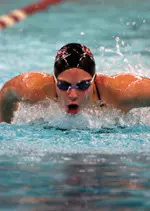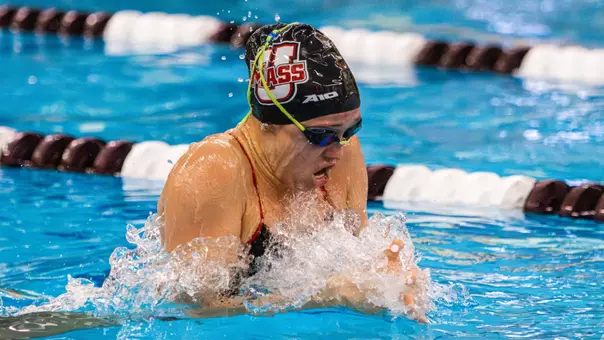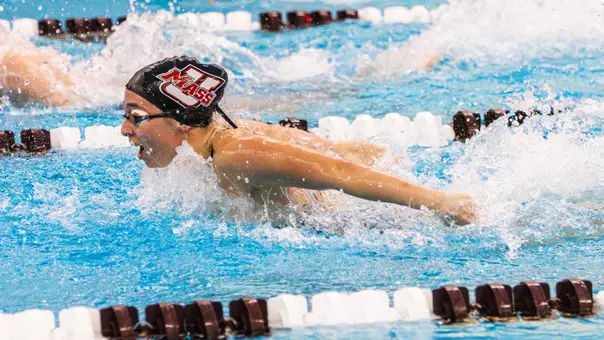University of Massachusets Athletics

Captains Keep Swim Teams Steady
December 15, 2005 | Women's Swimming & Diving
Dec. 15, 2005
One is quiet. One is organized. The other is loud and talkative.
Combined, the three of them guide a team full of young and old, humble and outspoken, tall and small alike, overseeing a team that must stay together as a unit.
Meet Aimee Bourassa, Corey Tawcyznski and Kaitlyn McDonough, the tri-captains of this season's Massachusetts women's swimmers. While the three maintain different personalities, they share one thing in common: the need to lead.
"I think when you're a freshman you learn from the upperclassmen," Tawcyznski, the organized one, said. "You watch them in the pool and in training, and feel you need to do what they needed to do, because they've been doing this [college swimming] longer and are more experienced at it."
That might explain the early success of freshmen Karen Upperco and Christa Narus, who have both got off to stellar starts through the first half of the season. Narus, who specializes in the freestyle and butterfly events, and Upperco, a diver, are both tops in their fields within the team.
Sure, they're talented, but it's a whole new type of swimming at the college level, and the new recruits ought to be made comfortable. Which explains the motive behind the big sister-little sister system, instituted to let them know they can talk to their big sister whenever they have a question or concern.
"I think that's really important to let them [the young ones] know that we do care about how they're doing in general, not just swimming-wise but as people," Bourassa, the loud one, said. "Because it is scary experience coming here, and all of a sudden you're with 40 people, men and women, that are just sort of there. They're you're teammates, but at the same time you want them to be your friend."
As for the early success of some of the freshman, Bourassa points out that it acts as encouragement to swim harder.
"These girls are awesome, and in a way they motivate us," Bourassa said. "You're in your senior year, been doing the same thing for so long, so to have a freshman come in there and push you around a bit, it makes you realize that you're not done yet - there's still a little bit left in you."
The personalities, as it turns out, seem to rub off on one another. Tawcyznski claims her off-campus roommate - Bourassa - picked up some of her organizational skills from being around her.
For the men, the storyline of different yet converging - not clashing - personalities carries over.
There's Pennsylvania native Mike Herald, who underwent open-heart surgery at the age of 15 and, being in the School of Management, is widely considered the "CEO" of the team. Jake Hogue, hailing from Colorado, tends to get fired up in practice and in meets, and is one of the hardest workers on the team. Local Amherst inhabitant Greg Chartier, perhaps similar to McDonough, tends to be the quiet one of the group.
In the eyes of men's head coach Russ Yarworth, personality is a must in getting this team to win a sixth straight Atlantic 10 title.
"You want to have characters [on your team], definitely," Yarworth said. "You can't train the personality out of your kids. You've got to have personality-that's what creates champions. You've got to have an edge, got to have that simple thing."
With no seniors on the team-all three captains are juniors-big things have been expected out of the captains, especially with no assistant coaches on the men's squad this year. Like the women, the men have received stellar efforts from its large freshman class. Through the first half of the season, Nate Bromage and Tristan Partridge have proven their worth in the pool with some outstanding times in the butterfly, freestyle and individual medley.
But here comes the twist.
UMass travels to San Juan, Puerto Rico on Jan. 7 for the Sacred Heart Invitational, which may seem like just another meet and a chance to soak up some beautiful water, dip one's toes in crisp sand and work on a tan. But it is here, on the Isle of Enchantment, where the first decisions on who will and who won't be going to February's Atlantic 10 Championships are made.
No doubt, feelings of rejection may come about. And while Yarworth sees the captains playing a part in keeping the team cohesive in light of cutoffs, he also sees a smooth transition.
"I think it's important that the kids who do make it are supportive of the ones that don't make it," Yarworth said. "And with the kids that don't make it, have a good attitude and don't internalize or mope about what's happened to them and not the team. Part of athletics is the good part and the bad part, when you don't make the cut. But you have to take that positively, and it's a good life lesson, because everything doesn't always work out for you."
Story courtesy Brendan Hall, sports writer for The Daily Collegian.




.png&type=webp)






